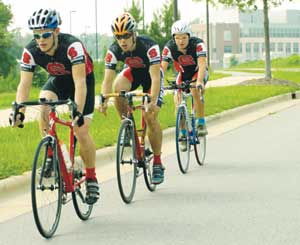Twenty-six days ago, 176 of the world’s best cyclists began the 93rd Tour de France in Strasbourg, France. On Sunday American Floyd Landis rode into Paris to capture his first Tour de France victory, extending the streak of American winners to eight years in a row.
With the retirement of Lance Armstrong, the winner of the seven previous Tours, this year’s event didn’t include a previous champion.
“This year’s Tour was a lot more exciting and interesting because the results were not predetermined,” Hannah Whitaker, a senior in art and design and president of the cycling club, said.
The Tour contained drama even before a pedal was turned. On the eve of the first stage, nine riders were disqualified on implications of blood doping in Operation Puerto.
Operation Puerto helped Spanish police discover the names of some prominent cyclists in the files of a doctor allegedly in charge of a blood doping ring. Included in this group were five-time second place finisher Jan Ullrich, the last cyclist to win the Tour before Lance Armstrong, and 2006 Giro d’Italia winner Ivan Basso, both considered favorites to win the Tour.
The combination of Lance Armstong’s retirement and Operation Puerto left this year’s Tour without the top five finishers in the Tour De France 2005.
“I was very disappointed with Operation Puerto,” Shawn Kane, a senior in mechanical engineering and a member of the cycling club, said. “My favorite rider was disqualified only because he was being implicated for doping, not because he had been proven to be doping.”
Kane said the loss of Ullrich, Basso and others hurt the Tour.
“Operation Puerto prevented some of the best cyclists from competing in one of cycling’s biggest events. It’s like having the World Cup without Brazil,” Kane said.
Some feel that Operation Puerto was necessary, and a positive occurrence for the sport of cycling.
“It was good for the doping allegations to come out because it kept potential cheaters from competing,” Matt Howe, a sophomore in biological sciences and a member of the cycling club, said. “It shows that work still needs to be done.”
Kane said one of the most memorable moments of this year’s Tour occurred in Stage 17 last Thursday.
After falling a little more than eight minutes behind the leader in Wednesday’s Stage 16, Landis dug himself a hole so deep few thought he had a chance at competing for the podium, much less the win. But the following day, in the Tour’s final mountain stage, Landis had an amazing stage, attacking the hills and making up nearly the entire time he lost on Wednesday.
“It was one of the best single-day performances I have ever seen,” Kane said. “It was next to impossible for him to get back into contention for the win.”
Howe echoed Kane’s thoughts on Landis’ comeback in Stage 17.
“It was one of the best stages I’ve ever seen. Lance never attacked in a single stage like Landis did in Stage 17,” Howe said. “What makes it more impressive is that Landis isn’t even known as a great climber.”
After Stage 17, Landis was in third place only 30 seconds behind leader Oscar Pereiro of Spain.
In Saturday’s Stage 19, Landis regained the lead in the Tour’s last time trial, and he went on to win the 2006 Tour de France on Sunday in Paris, coming back from eight minutes down just three days before.
Despite an American cyclist winning the event the last eight times, members of the cycling club say media coverage and popularity of cycling has a long way to go in America.
“The Tour de France is the pinnacle of the sport. But there are several other cycling events that deserve attention in America,” Whitaker said.
Howe said the Tour is good, but that it provides an incomplete picture of the world of cycling.
“The tour shows a general view of cycling,” Howe said. “But there are three grand tours, including the Tour de France, Giro d’Italia and Vuelta a España, all of which are extremely popular in Europe and should garner more attention in America.”
Whitaker said media coverage of cycling is nearly non-existent.
“The media coverage of cycling is abysmal and lacking,” Whitaker said. “There are local races all the time that local newspapers don’t even cover.”








